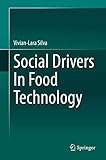Social Drivers In Food Technology [electronic resource] / by Vivian-Lara Silva.
Material type: TextPublisher: Cham : Springer International Publishing : Imprint: Springer, 2020Edition: 1st ed. 2020Description: XX, 83 p. 46 illus., 39 illus. in color. online resourceContent type: text Media type: computer Carrier type: online resourceISBN: 9783030503741Subject(s): Food—Biotechnology | Engineering economics | Engineering economy | Organic chemistry | Motivation research (Marketing) | Food Science | Engineering Economics, Organization, Logistics, Marketing | Organic Chemistry | Consumer BehaviorAdditional physical formats: Printed edition:: No title; Printed edition:: No title; Printed edition:: No titleDDC classification: 641.3 | 664 LOC classification: TP248.65.F66Online resources: Click here to access online
TextPublisher: Cham : Springer International Publishing : Imprint: Springer, 2020Edition: 1st ed. 2020Description: XX, 83 p. 46 illus., 39 illus. in color. online resourceContent type: text Media type: computer Carrier type: online resourceISBN: 9783030503741Subject(s): Food—Biotechnology | Engineering economics | Engineering economy | Organic chemistry | Motivation research (Marketing) | Food Science | Engineering Economics, Organization, Logistics, Marketing | Organic Chemistry | Consumer BehaviorAdditional physical formats: Printed edition:: No title; Printed edition:: No title; Printed edition:: No titleDDC classification: 641.3 | 664 LOC classification: TP248.65.F66Online resources: Click here to access online The story behind -- The new norm -- In the shopping cart -- Stay or leave -- Rules of the game -- Food for thought -- Index.
This unique and timely text is designed to help food science students learn to perform critical analysis of food processing technology and consider the incorporation of elements that touch on contemporary technological developments in the food sector. As the food industry adjusts to new consumer demands for safe and low processed foods, the time has come to harmonize product and process engineering with ‘relationship engineering’ from farm to fork. This increasingly allows the opportunity for food sector professionals to consider the existence of new drivers of food consumption. These newly discovered drivers are explored in great detail over the course of this book from industrial, economic and human resource viewpoints. Social Drivers In Food Technology presents a series of helpful case studies are presented covering six important food sectors: chocolate, coffee, yogurt, juice, baby food and snacks. These cases have been chosen in order to illustrate dynamic and innovative advances in food processing technology. The information provided over the course of this book has been gained through the thorough study of both scientific literature and organizational reports from food processing companies. The major economic aspects related to food technology are also outlined throughout the text. This multidisciplinary approach is motivated by the opportunity to contextualize the technological debate in strategy and organizational economics, contributing to the formation of human resources. This text is informed by the concept that one must look beyond the technology of the food processing sector and discuss opportunities that involve re-thinking product innovation and process, knowledge generation and human resource training. These innovations have been highlighted in food science & technology literature, but their economic and managerial implications have remained unexplored until now. With its informative case studies, helpful illustrations and quizzes and comprehensive, well-organized scope, Social Drivers In Food Technology is a much-needed textbook that will allow students to look at food processing technology from both industrial and economic perspectives and to consider the important human resource elements involved. .
